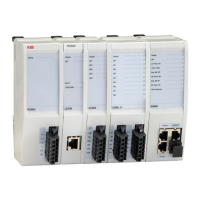Im ImY
I
U
j B
n
n
n
o
n
0
0
0
3
=
⋅
−
= ⋅
GUID-E96136FA-674F-4028-B209-7C9C6CD924A4 V1 EN (Equation 9)
nth harmonic frequency neutral admittance phasor
nth harmonic frequency zero-sequence current phasor
nth harmonic frequency zero-sequence voltage phasor
nth harmonic frequency susceptance,
n 2, 3, 5, 7 and 9
For fault direction determination, the fundamental frequency admittance and
harmonic susceptances are summed together in phasor format. The result is the sum
admittance phasor defined in Equation 10.
Y Y j Y Y G j B
osum
n
n
o osum
=
+ ⋅ +
= + ⋅
=
∑
Re Im
0
1
0
1
0
2
9
1
GUID-5118DA13-DEA7-4B40-83E9-16ED846BE790 V1 EN (Equation 10)
Fault direction determination
If an earth-fault is detected by the GFC module, the fault direction is evaluated based
on the calculated sum admittance phasor
obtained from the Multi-frequency
admittance calculation module. To obtain dependable and secure fault direction
determination regardless of the fault type (transient, intermittent, permanent, high or
low ohmic), the fault direction is calculated using a special filtering algorithm, that is,
the Cumulative Phasor Summing (CPS) technique. This filtering method is
advantageous during transient and intermittent earth faults with dominantly non-
sinusoidal or transient content. It is equally valid during continuous (stable) earth
faults.
The concept of CPS is illustrated in
Figure 70. It is the result of adding values of the
measured sum admittance phasors together in phasor format in chronological order
during the fault. The corresponding accumulated sum admittance phasor
is calculated using the discrete sum admittance phasors
in different time
instants (t1...t5). This phasor is used as directional phasor in determining the direction
of the fault.
Y t Y t
osum CPS osum_
( ) ( )
1 1
=
GUID-04F2B725-3060-46F9-BBC1-B2A0CFC986AF V1 EN
(Equation 11)
Section 6 1MRS757488 H
Commissioning
120 RIO600
Installation and Commissioning Manual

